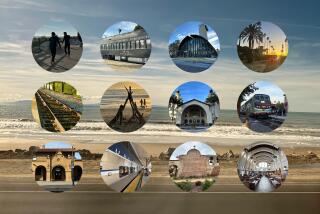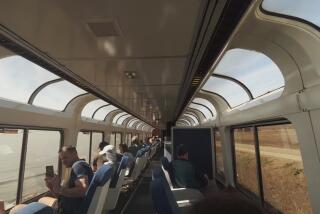Some Little Things About Europe That May Not Be in Those Books : Customs: Every destination has plenty of cultural oddities, the kind you seldom read about. Many of them revolve around the currency.
- Share via
Even experienced travelers run into occasional snags abroad that can prove costly or annoying.
Europe, which attracts almost 7 million Americans a year, is full of little cultural quirks that can trip you up, financially or otherwise, if you don’t keep your wits about you. I know. I stumbled several times on a recent two-week ramble through Europe, my eighth visit.
My recent country-hopping trip took me to West Germany, Czechoslovakia, Austria, Belgium and England. Along the way I kept a notebook handy to jot down all of the times I could have saved myself money or aggravation had I been aware of or remembered local customs, little things the guidebooks seldom warn you about.
Among the lessons I learned or relearned:
--That full basket of breads the waiter in Vienna places on your table may tempt you, but don’t assume it is complimentary. The waiter in all likelihood will count the number of goodies you eat and add a couple of dollars or more to your bill.
--The fine old hotels of Europe sound wonderfully romantic in the ads, and in most ways they are. That is, until you discover you have been assigned twin beds, and very narrow ones at that. Twins appear to predominate in Europe’s older hotels, so if you prefer a double, specify that when making a reservation.
--When exchanging currency, compare both the exchange rate and the commission fee that is charged. In four of the five countries, I toured a commission fee of 2% to 4% was standard. Only in England did I find that the fee varied widely, from nothing to as much as 9%.
You can survey London banks and currency exchange houses for the best rate. But if you use only the best rate as your guide for converting dollars to pounds, you may not have made the best deal. Most currency exchange offices charge a commission, which can be as much as 9% of the transaction, so you have to compare commission fees as well as exchange rates.
I discovered that on my first morning in London. In a hurry, I stopped at the first exchange office I saw, TTT Foreign Exchange, which was operating from a window tucked into a commercial arcade just a few steps from my hotel door in Knightsbridge.
The day’s exchange rate for dollars, posted above the window, seemed reasonable; it was lower than the rate quoted the evening before at Heathrow Airport. So I handed over $200 in American Express traveler’s checks. I got back only 107--fewer than I had calculated--so I asked for an explanation. The clerk informed me that TTT’s commission was 8.5%, which translated into a cost of about $17. I was dumbfounded.
In the next hour I visited about a dozen exchange offices, including several banks, an American Express office and the exchange office at Paddington railway station. In each instance I asked how many pounds I would get for $200 in American Express traveler’s checks. All the responses were different.
Each quoted a basic rate that ranged only slightly, from $1.70 to $1.72 per pound. The big difference was the fee. The worst return I was offered for my $200 was at Paddington station, where I would have received only 101. The best exchange, not surprisingly, was at the American Express office, which imposed no commission fee. I would have received 117. The Royal Bank of Scotland offered 113; Deak International offered 112; Thomas Cook 111. The 16 difference between the Paddington rate, 101, and American Express, 117, amounted at the time to about $27. Obviously, it pays to shop.
In TTT’s favor, its office is open from 8:30 a.m. to 11 p.m. seven days a week.
--Make plane reservations during business hours. In the United States, travelers are accustomed to calling an airline’s central reservation number any hour of the day, seven days a week.
In Europe, many--if not most--airlines staff their phone reservation desks only during normal business hours, which may mean weekdays from 9 a.m. to 5 p.m. In contrast, you can generally buy a railway ticket 24 hours a day at central city railway stations.
--Plan for meals on trains. Many of Europe’s trains do not carry dining cars and make no provision for meals. You either carry a picnic or scurry to a vending machine or food stall if the train halts at a station long enough.
We ran into this problem on the 6:15 a.m. train from Prague to Vienna. Our train from Frankfurt had carried a dining car and we figured the next train would also. It didn’t. And the Vienna-bound train never stopped long enough anywhere so we could buy something along the way.
At larger train stations there is usually a sign beside the track you are leaving from that indicates what cars make up the train. If no dining car is indicated, and your journey is a long one, hasten to the nearest food stall for picnic supplies.
--Beware making assumptions about changing money outside capital cities. Most capitals’ airports have currency exchange offices that are open around the clock. But don’t count on an exchange facility if you are arriving at a small-town railway station during off-hours. Plan to exchange sufficient money in advance so that you at least can pay for a taxi to your hotel and get a meal.
Vienna is not a small town, but our train from Prague arrived at a small-city station that had no currency exchange office. We had no Austrian schillings and the banks in the neighborhood were closed for lunch. So we spent our first hour in Vienna waiting for the banks to reopen. Only then could we pay for a cab to our hotel.
--Watch for extra charges when dining in restaurants. Charges that are not customary in the United States can add to a European restaurant bill, especially if you frequent higher-priced places.
Some fine European restaurants impose a cover charge. At Salut, a popular cafe near the Vienna Opera House, the charge was 35 schillings each, or about $6.30 for two people. The amount is added to your bill as soon as you sit down.
At Zu den drei Husaren, reputedly Vienna’s finest restaurant, the cover charge was 40 schillings each, or $7.20 for two. In addition, an entertainment charge of 60 schillings was added to the bill because a pianist was playing in another room ($5.40). We had already spent more than $12 and hadn’t even taken a sip of water.
In our experience, the cover and entertainment charges were added only at the more expensive restaurants. We dined in budget-priced beer halls and schnitzel houses in Vienna where only the bread was an extra.
One of the pleasures of Europe is hearing some of the world’s greatest musicians in some of the world’s most splendid concert and opera halls, but don’t expect a free printed program. At the Vienna Opera House we paid a little more than $2 for a single program booklet and shared it. In a London theater the price was closer to $1.20.
--Carry extra change. A small fee often is charged for the use of public restrooms in Europe. This is no problem if an attendant is on duty who is able to make change if you have no small coins. But in this increasingly mechanized world, some of Europe’s toilets are coin-operated. This is true, for example, in Frankfurt’s busy central railway station. Keep a pocketful of change ready.
--If you consider a washcloth an essential bathing accessory, take one with you, along with a plastic bag to store it in. For whatever reason, many European hotels, even the expensive ones, do not provide washcloths. Hand and bath towels, but seldom a washcloth.
--Be aware that it often is hard to avoid secondhand smoke. Europeans have yet to heed the health warnings about tobacco to the extent Americans have. Smoke-filled air can be a problem in small restaurants, and there is not much you can do except endure it with good grace. Or leave.
You may even have to put up with pipes and cigars, which are usually discouraged in U.S. restaurants. We dropped into a London pub to enjoy the nightlife but the smoke in the air drove us out quickly. If you are traveling by train, reserve a seat in a nonsmoking car or cabin; most trains have them.
--Remember that the purchase of a rail ticket or a Eurailpass does not guarantee you a seat on the train. To get a reserved seat you must pay extra, which could cost as much as $6. In most European train stations you buy your ticket first at one window and then get your reservation at a second window. The double transaction can put your linguistic skills to the test.
--Calculating exchange rates doesn’t require a pocket converter or a math degree. All currency exchange offices quote daily exchange rates in a standard formula.
Once I have exchanged money I make it a habit to determine immediately how much the basic unit of the local currency is worth in U.S. money. What is the value, for example, of one Austrian schilling? To get the answer, simply divide 11 schillings into $1, during our visit. The answer: One Austrian schilling is worth about 9 cents.
With this figure in mind, I can go shopping anywhere in the country and conveniently know how much I’m spending, if I need to. If my lunch bill amounts to 80 schillings, I mentally multiply 80 by 9 cents and get $7.20. More easily, I might multiply 80 schillings by 10 cents and get, roughly, $8--close enough.
--In learning language basics, forget trying to memorize full sentences. Conscientious travelers, headed for a country where they do not speak the language, often try to prepare themselves by studying language tapes. The effort can be tedious and unproductive, even when the tape is only addressing the most simple concerns of a traveler.
Typically, a tape will form every question and every response in a full sentence. “Where is the nearest restroom, sir?” “Do you have a room available tonight for my wife and myself?” “I would like to buy a ticket on the train to Vienna.”
In practice you can get by quite nicely using only short phrases, the proper inflection of voice and a few gestures.
“Bathroom?” when asked in the local language with a hint of urgency usually is sufficient to get you pointed in the right direction.
“Two tickets to Rome, please,” practiced aloud before you approach the ticket counter, should get you what you want.
“Two beers, please,” is enough instruction for any waiter.
More to Read
Sign up for The Wild
We’ll help you find the best places to hike, bike and run, as well as the perfect silent spots for meditation and yoga.
You may occasionally receive promotional content from the Los Angeles Times.






